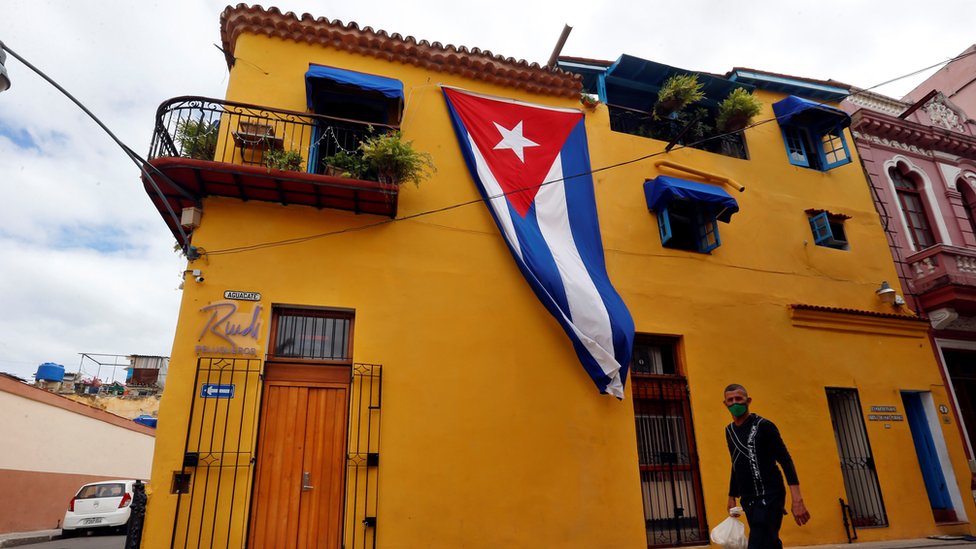On Monday, while the repercussions of the historic right-wing assault on the U.S. Capitol were the focus of national and international news, the Trump administration put Cuba on the list of state sponsors of terrorism, a list Obama had removed Cuba from in 2015.
In a press statement, Secretary of State Mike Pompeo said, “With this action, we will once again hold Cuba’s government accountable and send a clear message: the Castro regime must end its support for international terrorism and subversion of U.S. justice.”
The justifications were bizarre, highlighting just how much this is an anti-Cuban political maneuver meant to rev up Trump’s base. Pompeo argued that Cuba was “repeatedly providing support for acts of international terrorism in granting safe harbor to terrorists.”
The accusation stems from Havana’s refusal to extradite 10 leaders of the National Liberation Army (ELN), a Colombian guerrilla group, who a few years ago traveled to the island to hold peace negotiations with the Colombian government. This was the same process used to reach the Colombian government’s reactionary peace agreements with the Revolutionary Armed Forces of Colombia (FARC), another guerrilla group, in November 2016.
But after the talks failed, the Colombian government demanded that Cuba hand over the ELN negotiators because the ELN had attacked a police school in Bogotá. This demand overlooked a more complicated context: the attack came during a period of mutual attacks at a moment of conflict, when the Colombian army was much stronger and the conflict was favorable to the army. The Colombian army, it is worth remembering, was financed and trained for decades by the United States, which colluded with paramilitary groups and police to carry out all kinds of crimes, including killing civilian targets. One need only look at the numbers of social leaders and former members of the FARC killed after the 2016 accords to see who really sows the seeds of terror.
In his diatribe against Cuba, Pompeo added that the Trump administration is “countering [Cuba’s] malign interference in Venezuela and the rest of the Western Hemisphere.” This kind of moralizing seems more relevant for an evangelical pastor, not a national leader.
Pompeo goes further, claiming that “the Cuban government has fed, housed, and provided medical care for murderers, bombmakers, and hijackers, while many Cubans go hungry, homeless, and without basic medicine.”
Pompeo cynically laments the hardships suffered by the Cuban people as if this were not primarily the product of the economic blockade that Trump reinforced as soon as he came to the White House. Trump even went as far as blockading medical supplies during the Covid-19 pandemic. In other words, the Trump administration blames the Cuban government for the crimes that the United States commits.
On November 30, Cuban foreign minister Bruno Rodríguez denounced a U.S. “maneuver” to return Cuba to the list of state sponsors of terrorism. He explained that this was meant to “please the anti-Cuban minority in Florida.” He claims that the United States “guarantees refuge and impunity to terrorist groups that act against Cuba from its territory,” such as CIA asset Luis Posada Carriles.
Of course, the United States is the biggest funder, supporter, and perpetrator of violence, terror, and sanctions in the world. It organizes coups, military dictatorships, and the assassination of foreign leaders. It relegates the poor and working class of their enemies to complete desperation with vindictive sanctions, as well as military interventions and drone strikes, while at the same time supporting and funding governments with terrible human rights records, like Saudi Arabia and Israel.
Including Cuba on the terrorism list will mean increased obstacles to trade and furthered sanctions. But since the aforementioned blockade already weighs on Cuba, the objective is primarily political rather than economic. As Trump’s lawsuits to steal the election lost appeal after appeal in court, some of his former Republican allies deserted him, and the attack on the Capitol was widely repudiated. This maneuver to punish Cuba is meant to win points with the Republicans’ social and electoral base.
Polls show that 70 percent of Republican voters believe the election was stolen, and 45 percent approve of the January 6 assault on the Capitol. This important base of support, which comprises several tens of millions of people, includes anti-Castro groups concentrated in South Florida and other parts of the country. Hence, this new measure is more of a “propaganda coup” than action with real consequences. Yet, some speculate that it could complicate the chances that Joe Biden could quickly resume some level of a relationship with Havana.
In any case, such a “complication” would not be a legacy left by Trump, but rather a consequence of the new Democratic administration’s own foreign policy, from which, beyond gestures and a less confrontational discourse, no significant changes are expected in major geopolitical issues such as the trade war with China or the nuclear agreement with Iran. In the case of relations with Cuba, there are no major expectations either, but it cannot be ruled out that Biden will return to the path Obama walked with a “thaw” in bilateral relations and the partial relaxation of some of the most brutal restrictions imposed by the economic blockade. The governing bureaucracy in Cuba is betting on this scenario to advance its plan of pro-market reforms.
We repudiate Trump’s new measure, which is part of the long chain of aggressions that both Republicans and Democrats have perpetrated against Cuba. We demand the immediate lifting of the blockade, an end to interference against sovereign states, and the return of the Guantánamo base, which the U.S. government continues to illegally maintain and which is part of the military-terrorist apparatus that the U.S. has deployed worldwide.











